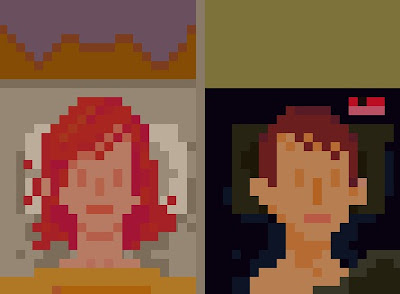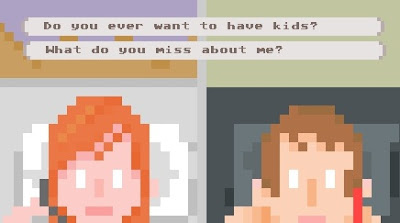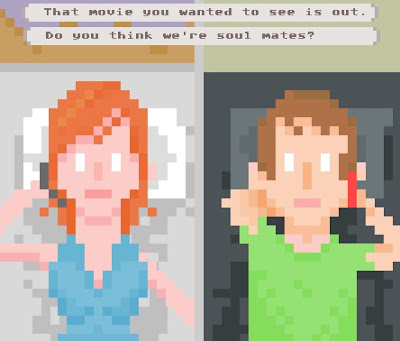Recently I came upon this game: Distance

The controls couldn’t be simpler. Mouse clicks advance the frame, and you watch the two characters go through their separate days. Then, each day ends with a phone conversation where you’re given a choice of two possible conversational routes.
You pick one, then see how things go, then go to sleep, then click through another day, the end of which sees you in this same place, making another choice.
The way this game is sneaky is that the choices slowly become deeper. Do you want to talk about a movie or soul mates?
There are a couple things about this game that really grabbed me.
What this game does well is capture the experience of those awful long-distance relationships. If you’ve never tried it, it’s awful. I would tell you to never try it, but that’s a ridiculous thing to say. Every person I know would declare “I would never want to be in a long-distance relationship” but what they’re really saying is, “Given the option to do it or not, I pick not.” The real question isn’t whether or not one would be in a long-distance relationship, in general. It’s really, “Would you be willing to engage in a long-distance relationship with [person you currently love very much]?” Those are two very different questions.
Having done this before, it’s tough. And what the game really does nicely is taking you back to that place where you’re really unsure about everything. Does she still love me? Do I still love her? Can I love someone even if we never occupy the same physical space? What if someone else comes along?

Even more so, and this part rang more true for me than anything, the game reminded me how shitty the phone is. When you have a phone-based relationship with someone, you have good nights and bad nights. And what’s really strange is you can’t be sure why some are good and some are bad. Why did asking about a beard turn into a conversation with laughs and both people hanging up happy? How did I ask about her dog and somehow turn things into discussing how we don’t agree on the idea of soul mates?
You can play it a number of ways as well. The way I played it was certainly trying to make things work, as though I am the person on one end of the phone. I felt really bad when things didn’t work out, but maybe making it work involves saying things not so much because it’s what you want to say, but saying what the other person wants to hear.
Yeah, it got kinda real for me in front of my computer there.
The thing that makes this game truly excellent is that it values story over all else. I was listening to the fantastic podcast The Indoor Kids and one of the hosts made a great point about the idea that story and emotional attachment are becoming king. Meaning: we’re quickly coming to a point where graphically, anything is possible. Games are less and less limited by someone saying, “That’s not possible,” and they’re more and more based on, “What do you want to do?”
The range of emotions I’ve experienced with video games is pretty much limited to the triumph of finishing Special World and the agony of being killed over and over by this asshole. And these emotions are all created as a result of my gameplay abilities, not because of story elements or characters. And what scares me about games like Bejeweled is that there’s no narrative, and really nothing for me to get into from that angle. I think that’s a lot of why I rarely enjoy driving games and sports games. Even Street Fighter II had backstories, slim as they may have been. But I don’t care so much about faceless drivers, and because I don’t follow sports the players are just cardboard cutouts to me.
So when someone asks “What do you want to do?” I would say that I want to feel something as a result of narrative. Maybe it’s just a little twinge, but SOMETHING would be a good start.
Resident Evil was one of the first games that was legitimately scary. God of War was one of the first games that used scale to underscore the narrative arc. But what makes Distance so fascinating is that it doesn’t find an emotional place within the larger context of missions and collecting. The emotions are the totality of the gameplay.
It can be done, and it can be done on a minimalist level. I think the gauntlet is thrown down. Personally, I’m looking forward to a world of gaming where some of the cash goes towards creating stories that are heartwrenching and hilarious, and characters who are memorable for their traits and not because they make handy mascots.



